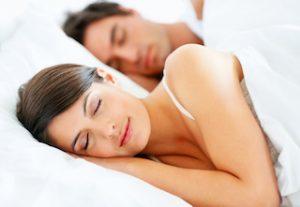Can’t Sleep? Here are our top 10 natural strategies to fall asleep fast!
There’s nothing worse than going to bed at a reasonable time only to find you are still awake hours later with unnecessary thoughts spinning in your head. To make matters worse your spouse seems to reach that irritating soft snore level within 7 minutes of hitting the pillow.
Sleep is a non-negotiable, biological necessity that affects our mental and physical health that can’t be substituted with copious cups of coffee. New research suggests sleep helps restore the brain by flushing out toxins that build up during waking hours. The toxin (beta-amyloid) is renowned for accumulating in the brains of patients with Alzheimer’s disease, so sleep in not just important, it’s critical for the health and wellbeing of our brains. Many cultures have said something along the lines “without sleep you’ll go mad”….. well science has now given these sayings a degree of validity!
Now that you know it’s not just about feeling drowsy and tired, how do you get enough shut-eye without the dependency of sleep medication? Well give these 10 natural strategies a go and see if this solves the problem!
-
Set the right room temperature…. Not too hot and not too cold. You don’t want to go from a sweaty betty to icicles toes. The ideal temperature is between 17-22 degrees Celsius. Your best sleep happens when your core body temperature drops a wee bit so switch off the central heating or electric blanket and save on bills as well as getting a good nights sleep …. it’s a win-win situation!
-
Reduce light pollution– Turn those electrical devices off and keep all electronics out of your bedroom. The bedroom should be designed for sleep only, not your second office. Clear out anything that has a light (including digital clocks) or makes any kind of sound. Your aim is to have a quiet dark place to sleep uninterrupted.
- Reduce EMF’s (electromagnetic fields). Research suggests a significant disruption of melatonin (our sleep-wake hormone) could be due to exposure to weak EMFs, so switch off your WIFI before bedtime.
-
Skip late-night sugar snacks. Most commonly sugar cravings start about the time you should really be going to bed so instead of reaching into the cupboard for an energy hit, head for the bedroom instead. If your blood sugar’s up, don’t expect to feel tired anytime soon.
-
Maintain your circadian rhythm (our biological clocks that regulate sleepiness and wakefulness) by keeping a regular sleep schedule… even on holidays and weekends. Aim for 8 hours and preferably go to bed before midnight. Run a trial and see what your best bedtime is. Your body will tell you by how good it feels the next day and I’de be surprised if it prefers a bedtime later than midnight!
-
Unwind your mind by reading in bed for 30 mins or so. A book is preferable as devices project too much bright light stimulating your pineal gland that is designed to respond to natural light at sunrise. Avoid tricking your brain into thinking it “rise and shine” time with artificial light exposure! Reading also gets the focus away from daily stresses and worries, so switch off and indulge yourself in whatever passion of interest you have.
-
Eat & drink for sleep during the day by choosing melatonin forming foods such as banana, avocado, asparagus, tomatoes, pomegranate, olives, grapes, broccoli, cucumber, rolled oats or a hand full of walnuts or cashews. Towards the evening always go for a light snack instead of a heavy meal where your body has to concentrate on digestion or indigestion if the case may be!
-
Mineral up with Magnesium known as the “sleep mineral” and calcium which helps the brain make melatonin from serotonin. A lack of calcium is linked to waking up in the middle of the night with difficulty returning to sleep…. sound familiar? Been blaming and resenting your snoring spouse unfairly?
- Hit the Vitamin B6 as this helps convert tryptophan (an amino acid) into melatonin. A deficiency is linked to poor sleep and low levels of serotonin contributing to mood swings and insomnia. Vit B6 rich foods include sunflower seeds, pistachio nuts, flaxseed, salmon, meat (chicken, tuna, lean pork, lean beef), dried prunes, bananas, avocado, spinach… just to name a few.
-
Best Drinks to boost your sleep are almond milk, chamomile tea, passionfruit tea & peppermint tea. Don’t add sugar as you want to calm your farm not energise it!
-
-
What to Avoid:
- Avoid Caffeine. Food and energy drinks that contain caffeine are a big no-no. Limit caffeine intake after lunch as it can affect you up to 12 hours.
- Avoid Spicy foods that cause heartburn.
- Avoid Alcohol. Contrary to popular belief alcohol does not help promote quality sleep. While it can make you drowsy and more likely to fall asleep faster, it often disrupts sleep and can stop you from entering the deeper, much-needed phases of the sleep cycles.
- Avoid High liquid intake or foods containing water such as watermelon 2-3 hours before bedtime. You don’t want to wake up needing to go to the toilet. Diuretics such as tea has the same effect. It’s very common for tea drinkers to need a night toilet run.
- Exercise early in the day as evening exercise stimulates and energises you making the wind-down more difficult.
-
Pillow Talk! Bedroom pillows would have to be one of the most underrated items we take for granted when it comes to sleep quality. What if I told you a poor performing pillow would irritate your neck ever so slightly that it may not necessarily cause discomfort but enough to send nerve messages to your brain (cerebellum) keeping it active during the night just enough to prevent that beautiful deep sleep we all remember as children, would you change your mind? Often we think we are just getting older or our kids have trained us out of a good night’s sleep. Well, I used to think that until I read research that suggested my pillow may very well be the culprit of my declining sleep quality. Changing my pillow to one that is designed for my size (as there is no such thing as “one size fits all” ) has made all the difference and now I sleep like a baby! Jealous? Book in and see one of our Chiros for a free pillow check and you could sleep soundly as I do every night! This would have to be one of the best-kept secrets when it comes to sleeping deeply. As an added bonus, your neck will also feel better and while you’re at it, you might as well ask about your mattress.


